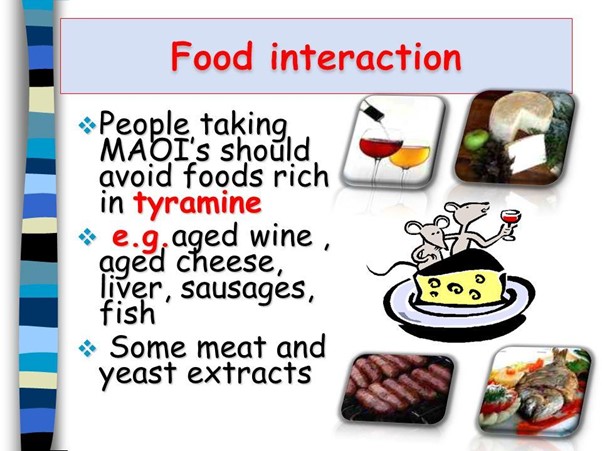A nurse is teaching a client who has a new prescription for an MAOI. Which of the following foods is contraindicated with this medication?
Cheese
Potatoes
Grapefruit
Eggs
The Correct Answer is A
Choice A reason:
Among the options listed, cheese is the food that is contraindicated with MAOI use. Cheese is high in tyramine, and consuming it while taking MAOIs can lead to a potentially life-threatening hypertensive crisis.
An MAOI (Monoamine Oxidase Inhibitor) is a type of medication used to treat depression, anxiety, and other psychiatric disorders. When taking MAOIs, it is important to avoid certain foods that contain high levels of tyramine, as it can lead to a dangerous increase in blood pressure known as a hypertensive crisis.
Choice B reason:
Potatoes: Potatoes are not contraindicated with MAOI use. They do not contain significant levels of tyramine.
Choice C reason:
Grapefruit: Grapefruit is not contraindicated with MAOI use. However, it can interact with certain medications, so it's always a good idea to check with the healthcare provider or pharmacist about specific medication interactions.
Choice D reason:
Eggs: Eggs are not contraindicated with MAOI use. Like potatoes, they do not contain significant levels of tyramine.

Nursing Test Bank
Naxlex Comprehensive Predictor Exams
Related Questions
Correct Answer is D
Explanation
- A. Diarrhea is not an adverse effect of amitriptyline, which is a tricyclic antidepressant (TCA). Diarrhea may be caused by other factors, such as infection, food intolerance, or stress. Therefore, this choice is incorrect.
- B. Frequent urination is not an adverse effect of amitriptyline either. Frequent urination may be a sign of diabetes, urinary tract infection, or other conditions that affect the kidneys or bladder. Therefore, this choice is also incorrect.
- C. Excessive salivation is not an adverse effect of amitriptyline as well. Excessive salivation may be due to increased production of saliva, difficulty swallowing, or mouth irritation. Therefore, this choice is incorrect too.
- D. Blurred vision is an adverse effect of amitriptyline and other TCAs. Amitriptyline can cause anticholinergic effects, such as dry mouth, constipation, urinary retention, and blurred vision. These effects are more pronounced in older adults and can impair their daily functioning and quality of life. Therefore, this choice is correct and the nurse should identify it as an adverse effect of the medication.
Correct Answer is A
Explanation
A. Correct. The nurse should avoid including raw fruits in the client's diet because they can harbor bacteria and fungi that can cause infection in a client who has neutropenia, which is a low white blood cell count.
B. Incorrect. The nurse should limit visits from anyone who is sick or has been exposed to an infection, but there is no need to restrict visits from young children specifically, as long as they are healthy and follow proper hand hygiene.
C. Incorrect. The nurse should measure the client's temperature at least every 4 hr, or more frequently if indicated, because fever is a sign of infection in a client who has neutropenia and requires prompt intervention.
D. Incorrect. The nurse should use disposable gloves from a box inside the client's room, not outside, to prevent cross-contamination and protect the client from exposure to pathogens.
Whether you are a student looking to ace your exams or a practicing nurse seeking to enhance your expertise , our nursing education contents will empower you with the confidence and competence to make a difference in the lives of patients and become a respected leader in the healthcare field.
Visit Naxlex, invest in your future and unlock endless possibilities with our unparalleled nursing education contents today
Report Wrong Answer on the Current Question
Do you disagree with the answer? If yes, what is your expected answer? Explain.
Kindly be descriptive with the issue you are facing.
